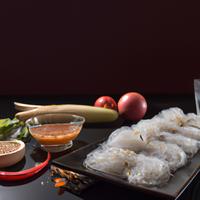
1 serving (100 grams) contains 350 calories, 0.1 grams of protein, 0.5 grams of fat, and 86.0 grams of carbohydrates.

Log this food in SnapCalorie

Nutrition Information
Calories |
700 | ||
|---|---|---|---|
% Daily Value* |
|||
| Total Fat | 1 g | 1% | |
| Saturated Fat | 0 g | 0% | |
| Polyunsaturated Fat | 0 g | ||
| Cholesterol | 0 mg | 0% | |
| Sodium | 20 mg | 0% | |
| Total Carbohydrates | 172 g | 62% | |
| Dietary Fiber | 2 g | 7% | |
| Sugars | 0 g | ||
| protein | 0.2 g | 0% | |
| Vitamin D | 0 mcg | 0% | |
| Calcium | 20 mg | 1% | |
| Iron | 1 mg | 5% | |
| Potassium | 20 mg | 0% | |
* Percent Daily Values are based on a 2,000 calorie diet. Your daily values may be higher or lower depending on your calorie needs.
Food Attributes
Source of Calories
About Thai glass noodles
Thai glass noodles, also known as "bean thread noodles" or "cellophane noodles," are a staple in Thai cuisine, made primarily from mung bean starch and water. These translucent, thin noodles are prized for their springy texture and ability to absorb flavors from sauces and broths, making them ideal in soups, stir-fries, and salads. Naturally gluten-free, they offer a versatile option for those with gluten sensitivities. Nutritionally, glass noodles are low in fat and calories, providing an energy source without significantly adding to dietary fat intake. However, they are primarily composed of carbohydrates and lack substantial fiber, protein, and other nutrients, so pairing them with vegetables and lean proteins is essential for a balanced meal. Due to their neutral profile, they can complement a wide range of dishes while providing a light and satisfying base for Thai-inspired meals.



